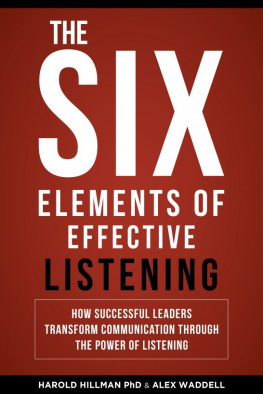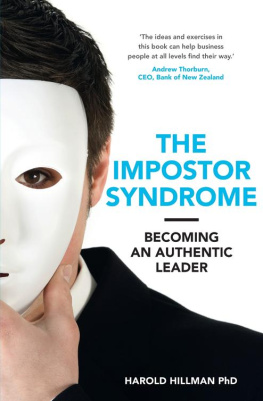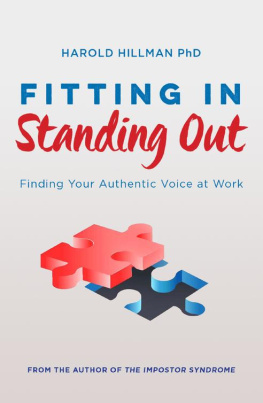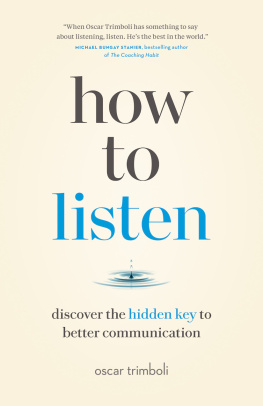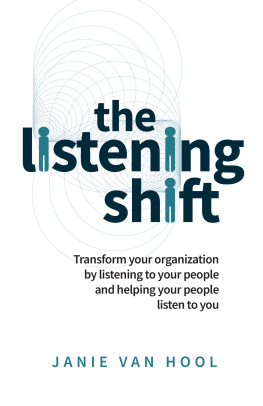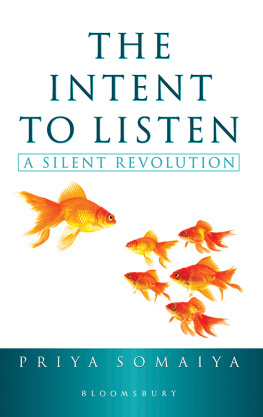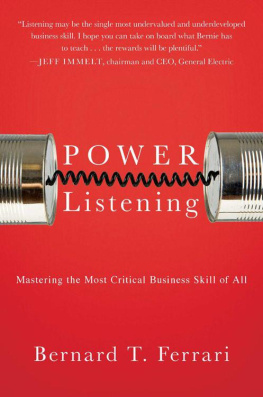The Six Elements of Effective Listening:
How Successful Leaders Transform Communication Through the Power ofListening
Harold Hillman Ph.D.
&
Alex Waddell, M.Bus.
Copyright 2016 by Sigmoid Curve ConsultingGroup
Published on Smashwords
All rights reserved. You cannot give this eBook awayfree or sell it. You do not have resale rights to this eBook. ThiseBook may not be reproduced in any format without the expressedwritten permission of Harold S. Hillman. All violators will beprosecuted.
While attempts have been made to the verifyinformation contained in this publication, neither the author northe publisher assumes any responsibility for errors, omissions,interpretation or usage of the subject matter herein.
This publication contains the opinions and ideas ofits author and is intended for informational purposes only. Theauthor and publisher shall, in no event, be held liable for anyloss or other damages incurred from the usage of thispublication.
Smashwords Edition, License Notes
This ebook is licensed for your personal enjoymentonly. This ebook may not be re-sold or given away to other people.If you would like to share this book with another person, pleasepurchase an additional copy for each recipient. If youre readingthis book and did not purchase it, or it was not purchased for youruse only, then please return to your favorite ebook retailer andpurchase your own copy. Thank you for respecting the hard work ofthis author.
ISBN 978-0-473-35309-4
Dedication
Inspired by Charlotte Roberts, who listenswith great ease and encourages us all to ask the question as oftenas possible.
How do you want me to listen?
About the Authors
Harold Hillman is the managingdirector of Sigmoid Curve Consulting Group. Based in Auckland since2003 and a New Zealand citizen since 2008, Hillman coaches businessleaders and executive teams to be more purposeful about leadershipand what it means to inspire others towards greaterpossibilities.
Prior to launching Sigmoid, Hillman served insenior executive roles with Fonterra, Prudential Financial andAmoco Corporation. A clinical psychologist in his early career, hedeveloped a passion for leadership development while teaching atthe United States Air Force Academy. Hillman was a member of thetask force commissioned by the Clinton administration in 1993 toend discrimination against gay citizens wanting to serve openly inthe US military.
Hillman earned a masters degree in educationfrom Harvard University and a PhD in clinical psychology from theUniversity of Pittsburgh. His first book, The Impostor Syndrome,was published in 2013. Hillmans second book, Fitting In-StandingOut, was published in 2015 and brought major attention to hispersonal story of living an inauthentic life as a well-decoratedmilitary officer, who happened to be a closeted gay man.
Alex Waddell is director of growth& capability at Sigmoid Curve Consulting Group. He leads thefirms social media and marketing strategy, which includes thelaunch of business apps, a weekly podcast, the firms acclaimedblog, and an extensive presence on You Tubes Sigmoid channel.
Waddell earned his B.A in Sport &Recreation and his M. Bus., both from Auckland University ofTechnology. His masters thesis was published in the Journal ofManagement Learning in 2014, a study which examined the influenceof senior leaders on organizational learning.
Listen! Some Thoughts for the Reader:
When I ask you to listen to me and you startgiving advice, you have not done what I asked.
When I ask you to listen to me and you beginto tell me why I shouldnt feel that way, you are invalidating myfeelings.
When I ask you to listen to me and you feelyou have to do something to solve my problem, you are not helpingme, strange as that may seem.
Listen! All I asked was, that you listen.
I can do for myself, I am not helpless. I maybe discouraged and faltering, but Im not helpless.
When you do something for me that I need todo myself, it makes me feel less confident.
When you accept as a simple fact that I dofeel what I feel, no matter how irrational, it will be so mucheasier for me to quit trying to convince you. And then we can moveto a different place in the conversation.
When that is all clear to us both, theanswers start to become more obvious.
Please listen and just hear me, and if youhave the urge to interrupt please, just wait a minute for yourturn, and then I will listen to you.
Contents
The Power of Listening
Have you ever walked away from aconversation wondering how it could have turned out so badly? Youstarted with the best intentions. To listen. And then everythingseemed to unravel. Worst yet, you learn later that you have areputation as a poor listener.
People perceive that you dont understandwhere theyre coming from. Soon enough, they stop coming at all.Listening is more than the sensory stimulation of auditory neurons.You can hear others without listening.
To hear is about channelling and receivinginput. Listening gives meaning to that input. Hearing is tolistening as drum beats are to rhythm. Listening takes those rawbeats and moves them to deeper meaning. Rhythm.
This book intends to give meaning to what youhear by introducing six different listening styles. It breaks thecode on listening as an amorphous, passive activity. Rather,listening is redefined as an active skill that positions thespeaker and listener as learners. More than ever before, wereclear about how relationships drive business.
Our ability to build and sustainrelationships is a source of competitive advantage. Building therelationship is akin to hearing. We get everybody to the table andagree theres the potential to build upon something important.Sustaining the relationship requires listening. By listening,leaders help provide meaning.
The message is a simple one. Move beyondpassive hearing and strive to become an active listener. By doingso, youll be a more effective leader.
How do you want me to listen? Let thisquestion become your guiding principle when lending an ear toanyone who:
1. Asks you for a few minutes to talk aboutsomething pressing
2. Seeks your opinion or guidance on an importantmatter
3. Seems to be circling around a topic for somegreater meaning
4. Seems stuck and is frustrated over the lack ofprogress
There are other scenarios that are primeopportunities for you to clarify not only your intent to listen,but the listening mode in which you can be most helpful.
It looks like you really need to get some thingsoff your chest. How about I be quiet and give you the space to dothat?
I can listen as a mirror to what I hear yousaying. Every now and then, Ill just paraphrase what Im hearingfrom you and that might help you wade through the conceptualclutter.
I can listen for any major assumptions that I hearin your thinking. When I hear one that seems to be driving eitheran emotion or an action, I can stop you and ask if the assumptionis valid or needs to be tested.
I can listen for where you appear to either shutdown on considering other possibilities or are so big picturethat you havent considered some immediate details.
I can listen for where there may be linkages toother parts of the larger system that could have some impact on howsuccessful you are.
NOTE: A good listener is mindful of whatothers need in the moment.
1Listening with Compassion
Listening with compassion is a mostessential skill if youre asking your team to radically transformthe way they work. Transformation cannot happen without emotionalinvestment. You can validate that investment by giving your teamthe space to be human. This listening style is also the mostdifficult to use because it requires that you suspend judgment, inthe moment, and deal with emotion.

